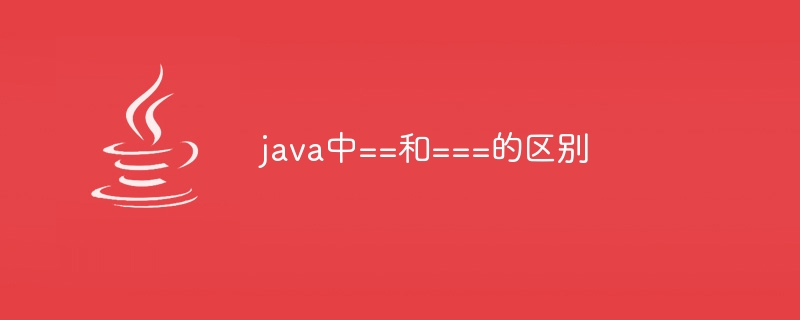The difference between == and === in java
Apr 29, 2024 am 01:30 AM== and === in Java are comparison operators used to compare the value or value and type of a variable. == only compares values, while === compares both values and types. Therefore: == is used to compare the values of primitive type variables. === is used to strictly compare the values and types of objects to ensure that they are the same object instance. Note: For object references, == compares the memory address, while === compares the actual value.

The difference between == and === in Java
Direct answer:
== and === in Java are comparison operators, but their usage and meaning are different. == compares the values of two operands, while === compares both values and types.
Detailed explanation:
== (value comparison)
- Compare the values of two operands, regardless of their type.
- If the values of the two operands are the same, return true, otherwise return false.
-
For example:
int a = 10; int b = 10.0; System.out.println(a == b); // true
Copy after login
=== (value and type comparison)
- Compare simultaneously The values and types of the two operands.
- Returns true only when the values and types of the two operands are the same.
For example:
int a = 10; double b = 10.0; System.out.println(a === b); // false
Copy after login
Usage scenario:
- == : Usually used to compare variable values of basic types.
- ===: Used to strictly compare the value and type of objects to ensure that they are the same object instance.
Note:
- In Java, == and === are independent operators and have no abbreviation.
- For object references, == compares the memory address of the object, while === compares the actual value of the object.
The above is the detailed content of The difference between == and === in java. For more information, please follow other related articles on the PHP Chinese website!

Hot Article

Hot tools Tags

Hot Article

Hot Article Tags

Notepad++7.3.1
Easy-to-use and free code editor

SublimeText3 Chinese version
Chinese version, very easy to use

Zend Studio 13.0.1
Powerful PHP integrated development environment

Dreamweaver CS6
Visual web development tools

SublimeText3 Mac version
God-level code editing software (SublimeText3)

Hot Topics
 Top 4 JavaScript Frameworks in 2025: React, Angular, Vue, Svelte
Mar 07, 2025 pm 06:09 PM
Top 4 JavaScript Frameworks in 2025: React, Angular, Vue, Svelte
Mar 07, 2025 pm 06:09 PM
Top 4 JavaScript Frameworks in 2025: React, Angular, Vue, Svelte
 How does Java's classloading mechanism work, including different classloaders and their delegation models?
Mar 17, 2025 pm 05:35 PM
How does Java's classloading mechanism work, including different classloaders and their delegation models?
Mar 17, 2025 pm 05:35 PM
How does Java's classloading mechanism work, including different classloaders and their delegation models?
 How do I use Maven or Gradle for advanced Java project management, build automation, and dependency resolution?
Mar 17, 2025 pm 05:46 PM
How do I use Maven or Gradle for advanced Java project management, build automation, and dependency resolution?
Mar 17, 2025 pm 05:46 PM
How do I use Maven or Gradle for advanced Java project management, build automation, and dependency resolution?
 Node.js 20: Key Performance Boosts and New Features
Mar 07, 2025 pm 06:12 PM
Node.js 20: Key Performance Boosts and New Features
Mar 07, 2025 pm 06:12 PM
Node.js 20: Key Performance Boosts and New Features
 Iceberg: The Future of Data Lake Tables
Mar 07, 2025 pm 06:31 PM
Iceberg: The Future of Data Lake Tables
Mar 07, 2025 pm 06:31 PM
Iceberg: The Future of Data Lake Tables
 How can I implement functional programming techniques in Java?
Mar 11, 2025 pm 05:51 PM
How can I implement functional programming techniques in Java?
Mar 11, 2025 pm 05:51 PM
How can I implement functional programming techniques in Java?
 How can I use JPA (Java Persistence API) for object-relational mapping with advanced features like caching and lazy loading?
Mar 17, 2025 pm 05:43 PM
How can I use JPA (Java Persistence API) for object-relational mapping with advanced features like caching and lazy loading?
Mar 17, 2025 pm 05:43 PM
How can I use JPA (Java Persistence API) for object-relational mapping with advanced features like caching and lazy loading?
 How do I implement multi-level caching in Java applications using libraries like Caffeine or Guava Cache?
Mar 17, 2025 pm 05:44 PM
How do I implement multi-level caching in Java applications using libraries like Caffeine or Guava Cache?
Mar 17, 2025 pm 05:44 PM
How do I implement multi-level caching in Java applications using libraries like Caffeine or Guava Cache?







